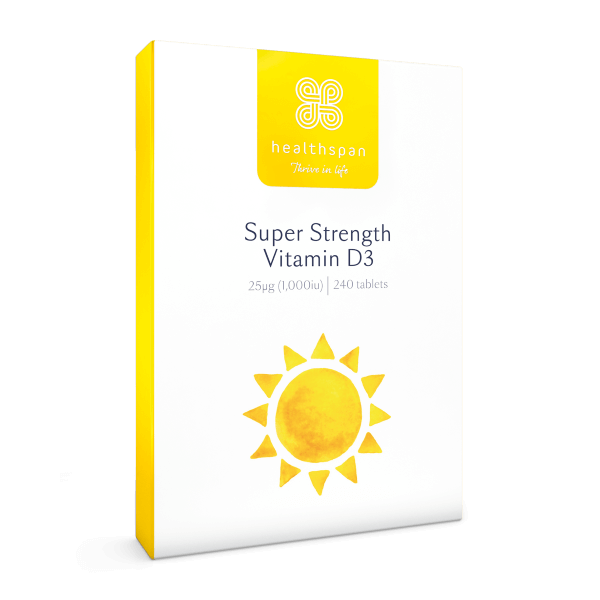Maintaining healthy joints and bones is important, but people are at risk of developing a variety of joint issues as a result of nutrient deficiencies. One particular nutrient that's essential for health – but that we often lack – is vitamin D.
Around one in five people in the UK have low vitamin D levels - a concerning number considering these low levels have been linked to bone and joint conditions such as osteoporosis, osteomalacia (or 'soft bones') and an increased risk of bone fractures.1
The symptoms of vitamin D deficiency vary and are often quite vague - and even hidden.2 Here, we'll take a look at why vitamin D is so important, and how to increase your intake to keep your joints healthy.
Who is at risk of vitamin D deficiency?
Until recently, it was believed that people living in the UK should be able to get sufficient vitamin D by eating a balanced diet and through sun exposure during the summer.3
However, the latest National Diet and Nutrition Survey shows that 17 per cent of UK adults have low vitamin D levels all year round - not just from October to March when sunlight isn't strong enough to trigger vitamin D synthesis in the skin.
If, as advised, you cover up in the sun and use high sun protection factor skin products, it's wise to take a vitamin D supplement all year round to bridge the gap.3
Some people are at high risk of vitamin D deficiency, and should definitely select vitamin D fortified foods and supplements all year round. These include children between one and four years old, people who get very little or no sunshine exposure, and people with darker skin.3
Some medical conditions also affect your vitamin D levels. Those with coeliac and Crohn's disease, for example, are at risk of vitamin D deficiency because of reduced absorption from the diet.4
The older you get, the more difficult it becomes to synthesise vitamin D in your skin, too.4 Therefore, as you age, it's important to consider taking a vitamin D supplement to prevent deficiency.
How does vitamin D affect bones?
Vitamin D plays many roles in the maintenance of strong, healthy bones. One key role is the absorption and regulation of calcium levels. Calcium is not only essential for bones, but also for muscle contraction, nerve impulses and secretion of hormones.5
Vitamin D controls how much calcium is absorbed from food into the body, as well as affecting how much calcium is excreted through the kidneys. Your body prioritises your serum calcium levels over your bones, so if there isn't enough calcium in the blood, vitamin D will remove calcium from the bones to correct it.5
This means that if you aren't getting enough vitamin D, your calcium levels may drop, which can increase your risk of osteoporosis and fractures associated with low bone mineral density.5
When you do have enough calcium, though, vitamin D acts directly on osteoblasts - the cells that lay down calcium in the bones. Sufficient vitamin D is therefore particularly important for building bone density, as well as maintaining it.6
However, vitamin D isn't just important for maintaining strong bones. It also plays an important role in your overall health by inhibiting many of the inflammatory processes that can occur in the body. Inflammation is both a contributing factor and an aggravating factor in many conditions, so avoiding deficiency is incredibly important.7
How to boost your vitamin D levels naturally
There are plenty of ways to boost your vitamin D levels naturally. One way is through increasing sunlight exposure.
When the skin is exposed to sufficient UVB light, the body will go through the process of producing vitamin D. So, the easiest way to support vitamin D production is to get yourself out into the sun.
According to the British Association of Dermatologists, going outside for a matter of minutes around the middle of the day without sunscreen can be enough.8 However, during the winter the sunlight may not be enough to get adequate levels of the vitamin.3
While sunlight triggers the synthesis of natural vitamin D in the skin, it's also important to consume vitamin D through your diet. Foods that contain vitamin D include eggs, oily fish and foods that are fortified with vitamin D.9 Mushrooms that are exposed to UVB rays can also contain a good amount of vitamin D.10
Taking a vitamin D supplement is a convenient way to ensure you are getting enough, particularly if you are at risk of deficiency.3 In addition to adults taking a supplement daily, it's also recommended that children between the ages of one and four are given a daily vitamin D supplement to ensure they have sufficient levels as they grow.
Ultimately, keeping your vitamin D levels sufficient can help not only your bone health, but also your overall health. From food to supplementation, it's important to make sure you're getting enough vitamin D from a variety of sources.

Super Strength Vitamin D3
For healthy bones, teeth, muscles and immunity
- 25mcg vitamin D per tablet
- Helps keep bones, teeth and muscles healthy, and supports immunity
- Multiple health benefits from 9p a day






